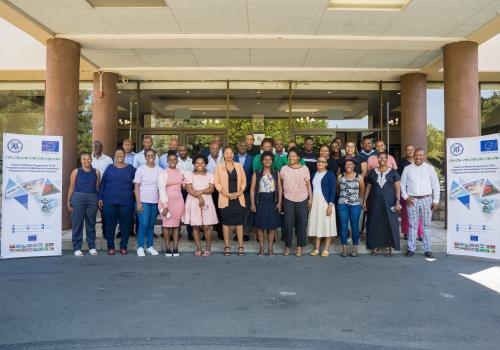The Southern African Development Community (SADC) conducted a five-day capacity-building workshop in the Kingdom of Lesotho from 4th to 8th March 2024 on sanitary requirements that are demanded when exporting food products and agricultural commodities to the European Union (EU) market.
The EU and SADC signed an Economic Partnership Agreement (EPA) commonly known as the EU SADC EPA, to preserve market access and preferences for Botswana, Eswatini, Lesotho, Namibia, Mozambique, and South Africa.
Agriculture is one of the sectors that benefits immensely from the improved market access under the EU SADC EPA, particularly sugar, dairy products, canned fruits, flowers, and fisheries.
Mr. Lebusetsa Pholosi, the Programme Officer for EPA at the SADC Secretariat, highlighted that the EU grants are 100 percent duty-free quota-free access for products originating from Botswana, Eswatini, Lesotho, Namibia, and Mozambique, and removes customs duties on 98.7% of imports coming from South Africa.
Non-compliance with Non-Tariff Measures (NTMs) in the form of Sanitary and Phytosanitary (SPS) requirements, as well as inadequate knowledge about SPS principles, were identified as major impediments to the growth of exports in food products and agricultural commodities from SADC EPA Member States to the EU market.
Additionally, high production, transportation, and marketing costs, along with inadequate testing facilities and conformity assessments, posed barriers to entry and trade in the EU market.
The SADC EPA Member States are required to establish and enhance their technical capacity to facilitate the implementation and monitoring of SPS measures, including promoting greater use of international standards and other matters concerning SPS.
In response to the lack of capacity within the SADC EPA Member States, the SADC Trade Facilitation Programme (TFP), which is funded by the EU, conducted a series of workshops in SADC EPA Member States aimed at enhancing technical capacity, facilitating implementation, and monitoring of SPS measures.
Ms. Nthabeleng Maphike, Senior Trade Promotion Officer at the Ministry of Trade, Industry, and Business Development of the Kingdom of Lesotho, said Lesotho had entrepreneurs who established their presence in the EU market under the EPA partnership however, the overall trade between Lesotho and the EU has not seen substantial growth because trading is currently based on products that offer minimal value addition.
Furthermore, Ms. Maphike commended the SADC Secretariat for presenting entrepreneurs in Lesotho the opportunity to acquire knowledge and experience on the requisite conditions required for trading in the EU market under the EU SADC EPA.
The capacity-building workshops in Botswana, Eswatini, Lesotho, Mozambique, and Namibia were attended by government officials involved in enforcing SPS measures, as well as producers, processors, exporters, and importers of food products and agricultural commodities.
The workshops will assist the SADC Secretariat in identifying challenges that impede SADC EPA Member States from fully participating in the EU market and in developing an SPS Implementation Plan which will include recommendations on improving the performance of the SPS management system within the SADC EPA Member States.

